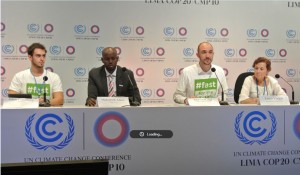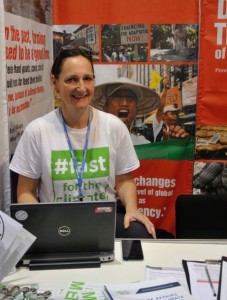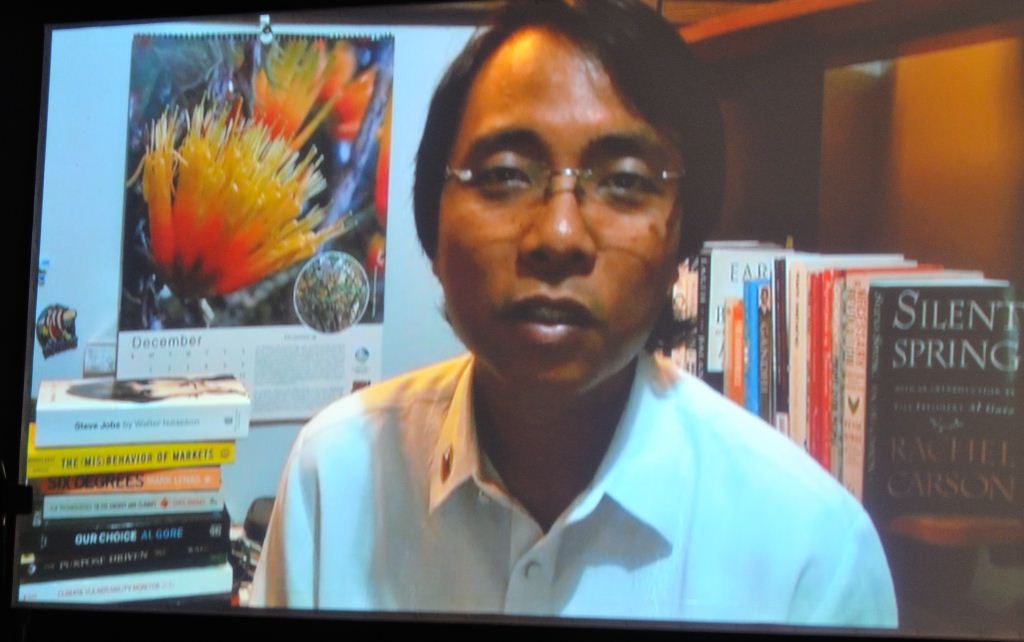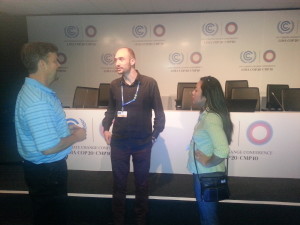In 2012, Typhoon Bopha struck the Philippines while CFACT was at COP 18, the UN climate conference in Doha, Qatar. Filipino negotiator Yeb Sano made a tear-filled speech pleading for a global warming treaty.
Last year Typhoon Haiyan dealt the Philippines a devastating blow around the time CFACT was working at COP 19 in Warsaw. Sano responded with a hunger strike that stole the show.
 A young global warming campaigner named Adam Greenberg fasted along “in solidarity” with Yeb for 13 days during that Warsaw event. Now today in Lima, Martin Kopp, “climate justice advocate” for the Lutheran World Federation, Mohamed Adow of Christian Aid, and Laura Vargas of the Inter-Religious Council of Peru joined Adam to announce a project called, “Fast for the Climate” at a press conference at the Pentagonito. Sano joined in via a pre-recorded video.
A young global warming campaigner named Adam Greenberg fasted along “in solidarity” with Yeb for 13 days during that Warsaw event. Now today in Lima, Martin Kopp, “climate justice advocate” for the Lutheran World Federation, Mohamed Adow of Christian Aid, and Laura Vargas of the Inter-Religious Council of Peru joined Adam to announce a project called, “Fast for the Climate” at a press conference at the Pentagonito. Sano joined in via a pre-recorded video.
“People are living and dying and suffering,” Greenberg said. “During COP 19 the Philippines were slammed by a typhoon. The price we’re paying is in human lives.”

It’s a tear-jerking narrative, yet the problem is that the scientific data shows that Typhoons Haiyan and Bopha were natural weather events with no meaningful connection to global warming. The IPCC was unable to state a serious short-term link between typhoons and climate. Similarly, Typhoon Hagupit, which is headed for the Philippines this weekend, is a product of natural weather variability.
Severe storms often form in Southeast Asia this time of year. They did so before the industrial revolution and will continue to do so whether you drive a car and air condition your home, or not.
Indeed, history records naturally occurring severe typhoons having major impacts on the affairs of empires, going back centuries. In both 1274 and 1281, Kublai Khan attempted to conquer Japan only to have the Mongol fleets destroyed by massive storms which the Japanese  called “kamikazes” or “divine winds.” These storms later gave their name to the Japanese suicide pilots who hoped to block the imminent invasion planned by the allies at the close of WW II.
called “kamikazes” or “divine winds.” These storms later gave their name to the Japanese suicide pilots who hoped to block the imminent invasion planned by the allies at the close of WW II.
 called “kamikazes” or “divine winds.” These storms later gave their name to the Japanese suicide pilots who hoped to block the imminent invasion planned by the allies at the close of WW II.
called “kamikazes” or “divine winds.” These storms later gave their name to the Japanese suicide pilots who hoped to block the imminent invasion planned by the allies at the close of WW II.“People will keep fasting one day every month until the Paris talks in 2015,” Kopp said. “Every day for the next 365 days somebody will be fasting. The fast will actually travel all around the world. Finish in France at the beginning of COP 21.”
“People are suffering now because of climate change,” Vargas said. “All kinds of life are suffering. Climate change is not for the future. Climate change is affecting us right now.”
Emotional arguments such as these collapse when we consider that climate computer models  call for a far warmer world than observations of real-world conditions have shown. Only a few years have clocked in at 1/2 a degree above baseline — not enough warming to account for storms, droughts, floods, fires or the rest of the plagues the global warming folks would like us to believe are caused by economic freedom.
call for a far warmer world than observations of real-world conditions have shown. Only a few years have clocked in at 1/2 a degree above baseline — not enough warming to account for storms, droughts, floods, fires or the rest of the plagues the global warming folks would like us to believe are caused by economic freedom.
 call for a far warmer world than observations of real-world conditions have shown. Only a few years have clocked in at 1/2 a degree above baseline — not enough warming to account for storms, droughts, floods, fires or the rest of the plagues the global warming folks would like us to believe are caused by economic freedom.
call for a far warmer world than observations of real-world conditions have shown. Only a few years have clocked in at 1/2 a degree above baseline — not enough warming to account for storms, droughts, floods, fires or the rest of the plagues the global warming folks would like us to believe are caused by economic freedom.How high would the carbon tax have to have been to prevent Typhoon Haiyan? The question is absurd. Sadly, trying to change the weather through hunger strikes is equally absurd.
The hunger strikers are demonstrating against the very freedom and prosperity that developing nations need in order to effectively respond to natural disasters and minimize suffering and loss of life.
Yeb Sano should have tried the pierogies in Warsaw, and this year’s climate fasters should be sure not to miss the ceviche before they leave Peru.
________


The late season typhoon is unfortunate ammo for the global warming farce promoters.
The Philippines is in a typhoon belt. Every year they happen.
Yes, Johnny ….. the climate changes (cc)…. and it has been changing since the beginning of time …. sometimes it gets a little warm (gw) and sometimes it gets little cool. There are some obvious logical reasons for gw and cc, the cumulative effects of: 1) to a lesser degree (pun intended) the Milankovitch effect, the relative positions of the Earth/Sun throughout the Earths elliptical orbit and seasons; 2) the Suns varying energy out put (solar storms), after all the Sun is a massive nuclear furnace without a thermostat; 3) the Earths own massive molten core and tectonic plate system that has gaps at the mid Atlantic and Pacific ridges and other locations. At any one time there are thousands of geothermal zones and volcanoes (ocean bottom and on land) that emit massive amounts of molten lava at ~2,000*F, hot ash and toxic gasses (CO, CO2, NO, NO2, H2S, O3 (ozone), SO2, steam and others; 4) the radical liberals, progressives, demowits and commies hot gasses when they protest, complain, whine and throw tantrums. They can’t control any of those natural causes …. so they chose humans to blame. All we need to know is what’s contained in text books on astronomy and geology 101. Pretty simple …. doesn’t require a PhD or any rocket science. Regards, retired mechanical engineer, amateur astronomer and geologist.
T hank God for you, rearagangs
I have always maintained that simple intermediate science is all that is needed for those money-grabbers maintain that humans are responsible for global warming (so called climate change.) Thanks.
Climate Change Believers all ignore historical facts. In this generation above all generation with Google phones you can ask a Historical Question and get an immediate answer, without hours of Library research this MAKES NO SENSE.
Clearly those willing to fast to change the normal is a clear sign that belief in Global Warming, and Climate Change is only a serious MENTAL DISORDER ONLY of extreme ignorance and Mass hysteria. These problems are better addressed by Psychologist with an open mind, to the causes of this Mass hysteria, than any thing that has to do with CO2 Emissions. Fasting will only make them stupider, threw Malnutrition a Cult tool used for mind control. Plus I’LL bet there is substantial proof that the Majority of these same people are Vegan and lack the mental ability to understand and distinguish true fact Facts.
A devolution civilisation lacking protein from meat, that separated us from the Animals to pursue Science in the first place. YUP! ITS A MENTAL DISORDER Climate Change Hysteria !!
Yes, they are all as mad as a box of frogs! However, this madness will cost us all in the end, whatever our economic status, unless we stop it!
The climate scientists and the politicians are in lock step. They both cling to CO2 as the villain of warming the earth. Yet, their models fail to prove that it is, However, that doesn’t matter. Their theory is that never say you have made a mistake. Rather, double down on your statements since a lie repeated long enough will wear some people down and gain supporters. They don’t recognize the skeptics views. Instead, they demonize the skeptics since they have no proof or scientific data that hasn’t been fudged to fit their theory. That is the reason the AGW group with the support of the IPCC and some governments agreed to change the name of their scam from “global warming” to “climate change”. The liberals in the US have used this slight of hand for years and has been somewhat successful in fooling some of their followers and the MSM. Examples include: “Taxes are really fees”. A war on terror is really an overseas contingency. Illegal immigrants are really only undocumented immigrants etc, etc, etc. The climate change agenda is to tax the richer industrial nations and to redistribute funds to poor nations. They of course must take a percentage of these funds for their efforts. This is the largest scam ever perpetrated on the citizens of the world and the results of the scam will have a zero affect on the actual climate. Of course, once they have the funds, it is too late. However, don’t worry since they have another scam to top this one that will really fix the problem.
Why don’t you all that insist on using what you suppose to be the local names for things — Beijing for Peking, Myanmar for Burma, Mumbleby for Bombay — also use the local names for these typhoons? Yolanda and Ruby, for example. There’s no scientific reason for substituting another name for them.
ΠΞ
Notice the book in the photo? ‘Silent Spring’ by Rachel Carson … which kickstarted the scare over DDT, and consequently led to the EPA’s ban on DDT, which ultimately impacted on the third world causing over 40 million deaths from malaria, according to the WHO. It says everything!
Today, carbon dioxide is the new evil. What the climate change charlatans falsely claim about carbon dioxide demonstrates their absolute ignorance of the important beneficial role played by this innocent trace gas.
If we could get all of the unethical pieces of human garbage to fast permanently we wouldn’t have to listen to their ridiculous scam anymore! Nirvana…!!!
Global Warming is the vehicle driving UN Agenda 21 …….It is all about population reduction , regulating and controlling all aspects of human life .